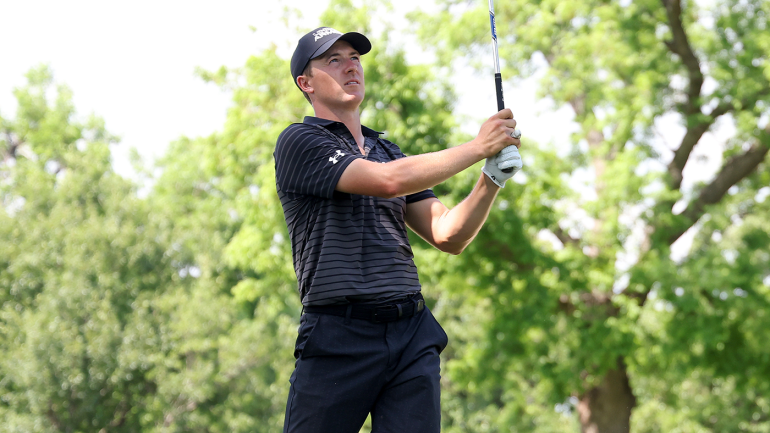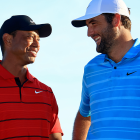
TULSA, Okla. -- Everybody dreams about golf. If you have ever cared even one iota about this sport, your mind must have danced with what the future might be holding in its hands to deliver to you at some later date. Golf is the most romantic but also the most accessible of all the sports, and that marriage makes it extraordinarily easy for anyone to slip into that fantasyland where desire and desperation often meet.
On April 12, 2015, Jordan Spieth won the Masters. Two months later, on June 21, he won the U.S. Open. Two years after that, on July 23, 2017, he took the Open Championship. Three of the four major championships. Three trophies on which his name is engraved. All of it in 27 months.
A fourth major this week at the PGA Championship would make Spieth the first golfer born after 1975 to achieve what only five have ever done before: placed all four major trophies on the mantle in their homes.
Sam Snead lacked the U.S. Open. Lee Trevino could not find a way to don the green jacket. Byron Nelson never won the Open Championship. Rory McIlroy is 0-8 at the Masters since winning the Open and PGA consecutively in 2014. Arnold Palmer, in some ways the spiritual forerunner to Spieth, also lacked the PGA Championship.
None of it was for lack of trying. Palmer finished runner up in 1964, 1968 and 1970. In the 1968 edition, he was upended by a single stroke with Julios Boros taking the title. Boros became the oldest major champion in history and held that title until Phil Mickelson -- who, coincidentally and somewhat famously, lacks the U.S. Open in his own bid for the slam -- won the PGA this time last year at age 50.
Spieth is the rare professional who seems transfixed by the romanticism of golf. Most men who make money playing this game eventually only care about that part of the equation. Playing professional golf is a job, and while the major championships are more fun and more competitive and more intense than everything that's not a major championship, more PGA Tour pros than you might imagine care primarily about the size of the check.
Spieth is just different. Part of this is because he's made well over nine figures on and off the course throughout his career and will probably approach a 10-figure number by the time his career is over. He can afford to care about things other than those figures, but there seems to exist within him an infatuation with the game that supersedes any amount of money. There's also a singular desire to take this week's PGA and finish off one of the most amazing first decade to a career in the last 25 years.
"If you just told me I was going to win one tournament the rest of my life, I'd say I want to win this one," Spieth said Thursday. "If you told me that before my career started I was going to win one tournament ever, I'd say the Masters because that was my favorite tournament growing up.
"But things change, and that has obviously significant meaning. Long term, it would be really cool to say that you captured the four biggest golf tournaments in the world that are played in different parts of the world and different styles, too. So, you feel like you kind of accomplished golf when you win a career grand slam, I guess."
Accomplished golf.
Every major requires a different skillset, and it's rare to possess them all. It's also rare to put yourself in position enough times at each one to eventually break through. Gene Sarazen touched off the slam at the second Masters in 1935. Then Ben Hogan did it at his first (and only) Open Championship. In 1953, Gary Player did it after him at the 1965 U.S. Open. Then Jack Nicklaus did it three different times, the same number as Tiger Woods, who is the only other person to accomplish the feat.
"[I've] come close a couple times," said Spieth, whose best chance came back in 2015 when he finished second to Jason Day despite gaining 18.4 strokes on the field, which is an amount that's normally enough to win a major. "This hasn't necessarily been my most successful major, but I feel good heading into this week. As I've said quite a you few times, [I'm going to] try and settle into this pairing the first two days and try and have fun with it.
"I think looking at it long-term, thinking, 'Man, if I'm healthy, I'd look to have 20 chances at it, and maybe one out of 20.' ... I normally get better odds than that. I think just more look at the long term, how many chances you're going to get, and maybe the ... bounces will go your way one of those weeks. I'm not trying to force it this week, I guess is the best way to say it. Just try and do what I've been doing, stick to my routine, my game, block out any outside noise and shoot as low a score as I can."
On Tuesday night, I literally dreamed about hitting pizza slices off a tee with a slice speed approaching 180 mph. This was as disconcerting as it was bizarre, but it underscores the broader point that (if you're reading this) you almost surely believe, which is that everybody dreams about golf. For you, it might be dreams of what it feels like to break 90 or perhaps what it feels like to make your first eagle or what you would do if you won your state amateur championship.
I don't know what your dreams about golf look like, but I do know that Spieth dreams (at least daydreams) about turning a five-man club into six on Sunday.
In the history of the world, fewer men have won the career grand slam than have sacked the empire of Rome. Spieth can draw those numbers even if he can conquer Southern Hills and navigate a field rife with myriad landmines. Golf is not war, of course, but the primal emotion of Spieth opening up the engines this weekend with that Oklahoma wind peppering the leaderboard might, for a brief instant, feel like an acceptable facsimile.
Dreaming keeps us hungry because, when we wake, we want to turn our deepest desires into reality. Spieth might dream about something different when he turns 30 or 36 or 41. He will almost surely dream of multiple green jackets or perhaps even multiple career slams like the man he'll play alongside Thursday morning (Tiger) owns. He might even dream about captaining a Ryder Cup team or two or hitting the ceremonial shot one day at Augusta National.
Our dreams change over time, but after listening to Spieth speak on Thursday, it's clear that his is stuck on repeat.
He needs the grand slam. He needs to accomplish golf.
How rarely does what we dream about materialize in real life, though? And how wonderful is the feeling when it actually does?
"What do you think it would mean?" Spieth responded when asked on Wednesday. "It would be pretty cool, wouldn't it? I think it would be pretty cool."

















